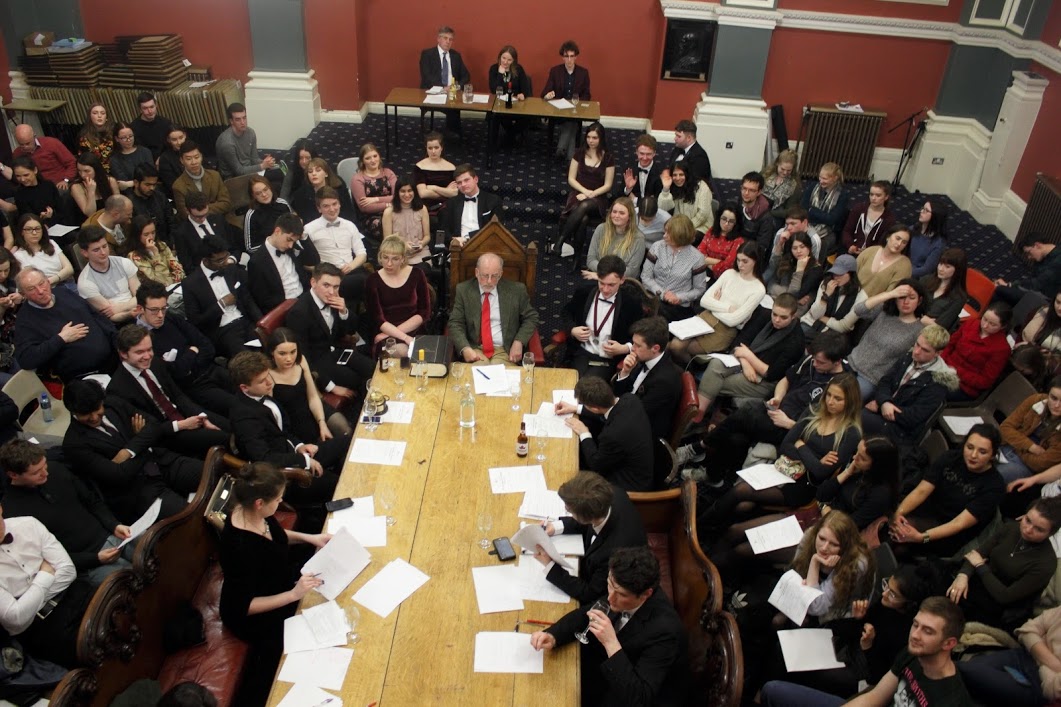Yesterday evening, the GMB became the venue for the annual Student Economic Review (SER) intervarsity debate held in conjunction with the Phil. Founded in 1987, the SER is a well-established undergraduate journal which provides a platform for the exceptional work of Trinity’s economics students.
This annual SER debate sees a team from Trinity compete against a team from another university disputing current economic issues. This year, the Trinity team faced a team from Harvard, with Trinity proposing the motion: “This House Believes the American Dream is Dead” while Harvard were opposing. Chairing the debate was Professor Patrick Honohan, an Honorary Professor at Trinity’s economics department and a member of the prestigious Royal Irish Academy. He outlined the rules of the debate before introducing the judging panel which consisted of Professor Martina Lawless, Dr. Sean Barrett, and Cormac Henehan.
In a humorous style, Harry Higgins kicked off the debate by speaking about the scene in Good Will Hunting where Matt Damon is in the bar and “there’s just this guy from Harvard and he’s got this ponytail and he’s just such a wanker and he thinks he’s better than everybody else just because he went to Harvard”. This was met by chuckles throughout the GMB. Higgins contended that this debate was probably going to play out like that scene with the Trinity side being Matt Damon. Once Higgins had finished teasing, he defined the “American Dream”. Higgins attested that it means that the “facts of your birth” should by no means determine “the facts of your life”. Yet Higgins asserted that this is not the economic reality. He highlighted the lack of social mobility within this “American reality” employing what he called “sexy economics words” such as the “bottom quintile” and the “top quintile”. Higgins blamed this on economic issues such as an unjust Medicare system, an ever-widening property gap and scant government funding in areas which are in the most need of it.
Harvard debater Romina Lilollari was first to oppose the proposition’s argument. Lilollari joked about the film reference Higgins had made stating that “Harry is definitely no Matt Damon,” receiving giggles throughout the room. Lilollari began contesting Higgin’s argument, stating he misunderstood the meaning of the “American Dream”. Lilollari stated that a turn of fortunes isn’t available to everyone but only a few. Additionally, she claimed that even if one is lucky enough to move up the social ranks, it is often not an immediate transformation from rags to riches but rather an “incremental change”. She asserted that this gradual improvement is being witnessed in America and the standard of living has risen dramatically within the last fifty years. Lilollari affirmed the the “American Dream” is more alive now than it has ever been before, “if you think the American Dream is dead then when was it ever alive?”
Trinity’s Clare Elwell presented the startling statistic that 70% of US citizens born into the lowest socio-economic group do not escape poverty in their lifetimes. Elwell stated that this statistic, contrary to Lilollari’s claim, does not indicate a tendency towards incremental change. Elwell went on to discuss the necessity of being rich if you want to get onto the political stage and contested that the “more money you have, the more freedom of speech you have”. Lastly, Elwell attested that the societal message that “if you work hard, you’ll make it big” is so damaging as it simply allows these people to become “dreamers” before turning the dreamer into a scapegoat.
Benazir Neree of Harvard was the second speaker on the side of the opposition. She refuted Elwell’s claim that poor people have little political influence on US politics arguing that “a bunch of poor white people in the Midwest” are largely responsible for the election of President Trump. The involvement of people of all socio-economic backgrounds in voting, protests, and other political movements is proof that poor people aren’t excluded from politics. Neree also disagreed that the ‘American Dream’ is used as a means of brainwashing the masses and shifting the blame away from the system. She contended that poor people “are not stupid” and they “don’t live under a rock”.
Last to share his argument for the side of the proposition was Christopher Costigan. Costigan first expressed his disapproval for the opposition’s contention that the “American Dream” is centred around incremental change remarking: “I don’t remember Ronald Reagan talking about incremental change.” Costigan continued by advocating for a fairer system in the US stating that the damaging link between educational institutes and property tax should be removed, higher income tax should be paid and the false ideals of meritocracy shouldn’t be used for indoctrinating the masses.
The final speaker was Clíodhna Ní Chéileachair who, despite her Irish name, was in fact debating on the side of Harvard. Ní Chéileachair pointed out the capitalist nature of the “American Dream” and contended that the system of capitalism is inevitably going to cause inequalities in society. Therefore, the argument the proposition offered that the “American Dream” is dead due to the large economic divide between the rich and the poor is, according to Clíodhna, incorrect.
After six exceptional speeches, a lot of speedy talking, and stimulating discourse, the judges announced that although both sides had “persuasive and eloquent arguments,” Trinity were to be crowned the winners due to their “use of statistics” which the judges, as economists, appreciated. Furthermore, the judges deemed the “cohesiveness” of Trinity’s arguments to be better than that of Harvard’s. Finally, they announced that the award for the best speaker was to go to Trinity’s Christopher Costigan. A triumphant evening indeed for Trinity’s Philosophical Society.







